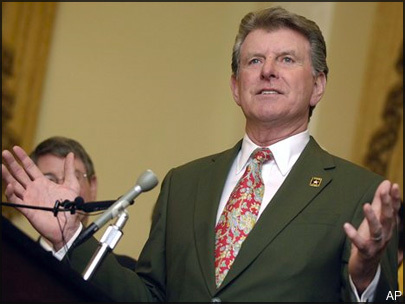As Idaho’s 2013 legislative session got underway in January, the state’s overwhelmingly Republican legislature struggled with ideological divisions over how to proceed with implementation of President Obama’s health care law. Given the GOP divide, the future of Idaho’s health insurance exchange may rest with the state’s minority party.
As the leader of a party with only 13 seats in the 70-member House of Representatives, Minority Leader John Rusche (D-Lewiston) acknowledges “it’s not often we can exert influence in the discussion.” In the debate over a health insurance exchange, however, the minority party’s votes may be responsible for either killing or implementing the program.
A retired doctor, Rusche has been a tireless advocate of implementing an exchange in the state. Although he says he’s uncomfortable with many aspects of Obama’s law, he has worked to tell his colleagues about what he claims to be a “significant detriment to the state of Idaho that will come with a federal exchange” if the state does not establish one on its own.
Although Rep. Rusche is hesitant to predict the how exchange legislation will fare, he does say the vote “will be really close.” A close vote in the House of Representatives would put the 13 Democrats in a powerful position.
Republicans Divided
Erik Makrush, a health care analyst with the Idaho Freedom Foundation, which has been warning the legislature about what it sees as the pitfalls of a health insurance exchange, says Republican legislators are divided on the issue.
According to Makrush, one faction of Republicans in the legislature is opposed to any legislation complying with Obama’s law. Another faction wants to take a cautious course in implementation, waiting to see what the Supreme Court will decide and how the 2012 election turns out.
With health exchange legislation yet to be introduced, Makrush says it’s too early to tell the size of these two groups.
“It is possible,” Makrush said, “that taken together these two groups could hold enough legislators to defeat any legislation to allow the state to set up a health insurance exchange.”
As legislators continue to learn more about the details of the Affordable Care Act, those opposed to immediate implementation are “gaining ground,” Makrush says.
Mistake on Medicaid Funding
He said this was especially clear after a misstatement by Republican Gov. Butch Otter in early January. Otter, who has opposed Obama’s law in lawsuits but has supported taking federal implementation grants, stated Idaho could lose $300 million in federal Medicaid matching funds if it did not set up a state exchange.
When confronted on this claim, Otter acknowledged he had made a mistake and federal Medicaid matching funds were not at stake.
Makrush says this incident “put the brakes on the urgency” of establishing an exchange and led legislators to ask more questions about exactly what the federal government required of the state.
Democrat Leader Urges Implementation
Rusche says Idaho Republicans who have relentlessly campaigned against the health care law now find it difficult to vote for any legislation that could be seen as complying with it. The Republican members “have a real problem,” he says, because “they’ve whipped themselves into a fervor” over Obama’s law. To Rusche, “this fervor isn’t supported by what’s good for the state.”
Although Rusche understands the opposition to implementation, he maintains “this is a policy choice; it shouldn’t be a political choice.”
“If they vote down the exchange,” said Rusche, “the irony of the situation is that they will have empowered the federal government to take over health insurance in Idaho.”
Rusche says the Democratic caucus has met with the Otter administration about members’ concerns and is keeping an open mind on the issue.
Rusche dismisses the notion Idaho Democrats will oppose the exchange to score a political blow against a Republican governor. Although he says he can’t predict how his caucus will vote, he acknowledges Obama’s law “is viewed by us as a signature achievement of a Democratic president. It’s hard not to support it.”




